Historic moment for primate conservation

Member of biomonitoring team up in the tree canopy to set up cameras. Credit - SW, Niger Delta Forest Project.
Groundbreaking success: First-ever footage of the Niger Delta red colobus monkey
Introduction
The Niger Delta red colobus monkey, known scientifically as Piliocolobus epieni, has long been considered by the International Primatological Society as one of the species that is likely to go extinct. First described in 1993, this species is native to the dense marsh forests of the Niger Delta in southern Nigeria. Due to its highly fragmented and shrinking habitat, sightings of the Niger Delta red colobus have been exceedingly rare, rendering it virtually unseen by the scientific community for years.
The Niger Delta red colobus monkey is classified as Critically Endangered on the IUCN Red List of Threatened Species. Habitat destruction, particularly due to logging and oil extraction, coupled with hunting pressures, led to a drastic decline in their population, leaving a small population hanging on by a thread in this one community where conservation efforts have been focused since 2021. This footage underscores the importance of timely conservation intervention for Critically Endangered species. A dedicated conservation effort that has spanned over a decade, from range-wide surveys, advocacy, outreach, and negotiating conservation agreements, culminated into active protection for the last known surviving population. The conservation efforts faced numerous challenges, including navigating the insecurity and the dangers that lurked in this tense socio-political landscape, and the inherent difficulty of tracking such a reclusive species in a swamp habitat. Despite these obstacles, the team’s unwavering commitment, supported by a host of international partners, was instrumental in achieving this groundbreaking success.
Significance of this milestone
Rachel Ashegbofe Ikemeh, Project Director SW/Niger Delta Forest Project says, “The footage of the Niger Delta red colobus monkey is more than just a visual record; it underscores the importance of conservation efforts in the Niger Delta and in Africa’s most populous nation - Nigeria." This camera-trapping effort will further provide invaluable data on the species’ distribution, habitat use and ecology, which are crucial for formulating effective conservation strategies.
Erepawei David, an Indigenous person of the Apoi community and Assistant Programme Manager for the Apoi Community Conservation Area says, “The successful documentation of the Niger Delta red colobus monkey opens new avenues for research and conservation but most importantly for investment in community-based conservation efforts.”
Aniekan-Abasi Uwatt, the programme manager, further adds, ”It calls for increased collaboration between international conservation organisations, local communities, and government agencies to implement robust protective measures.”
“The red colobus monkeys (Piliocolobus) are the most endangered primate genus in Africa, and have long been overlooked."
James Deutsch, Rainforest Trust CEO, stated: “Rainforest Trust is thrilled by this exciting news, and looks forward to continuing to collaborate with Rachel and SW/Niger Delta Forest Project to support the hugely impactful and successful work they are doing in this region.”
Barney Long, senior director of conservation strategies at Re:wild says, “Capturing these videos of the Niger Delta red colobus is a tremendous feat. The forest where these monkeys live is swampy and researchers and community rangers can only reach it by canoe or wading through waist-deep water, which is why visuals of the monkeys are extremely rare. All the local teams deserve huge credit for the work they are doing. The Apoi Community Conservation Area, which was created five years ago, is critical to protecting this species and it is now giving researchers an unprecedented glimpse of the endangered monkeys in the forest canopy.”
Reacting to this news, Russ Mittermeier, chair of the IUCN SSC Primate Specialist Group says, “The red colobus monkeys (Piliocolobus) are the most endangered primate genus in Africa, and have long been overlooked. Our recent action plan has sought to remedy this, and has highlighted some of the most Critically Endangered species in this group. The Niger Delta red colobus is one of these, and occurs in one of the most conflicted areas in all of Africa. It has survived largely through the herculean efforts of Rachel and her team, who have now succeeded in getting the first ever video footage of this species, a truly impressive accomplishment.”
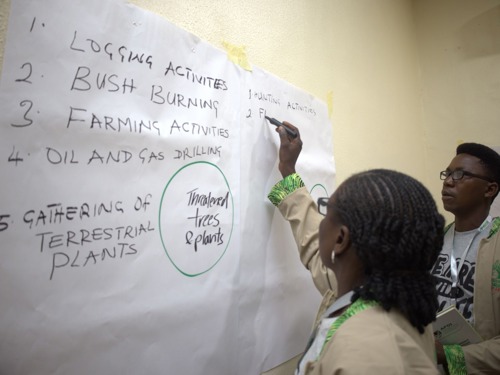
Collaborative efforts
The conservation actions that led to this remarkable achievement was a collaborative effort involving several key stakeholders. The Apoi community played the most critical role, making the decision to conserve portions of their communal forest when conservation wasn’t even a thing in this region. International conservation organisations and donors such as Rainforest Trust, Re:wild, Biodiversity Challenge Funds, Mohammed Bin Zayed Conservation Fund, Daughters of the Earth, Partners for Red Colobus, The Forest Collective, Florida Atlantic University amongst others provided the necessary funding and technical support, while the Bayelsa State Ministry of Environment, Department of Forestry has begun to provide the needed support for the conservation area to thrive. For example, see our news story shared here and our Policy Brief Series engaging government here.
Conclusion
The United Nations Environment Programme (UNEP) reports that over 13 million barrels of oil have spilled in the Niger Delta in the past 5 decades. The World Bank suggests the actual amount could be 10 times higher due to unreported incidents. This has led to widespread contamination of water, soil, and air, impacting local communities. Meanwhile, unregulated logging has become a major threat to biodiversity and livelihoods in the last decade, causing significant forest loss and ecosystem disruption in the region. This remarkable achievement in conservation illustrates how local initiatives can ripple across global networks, influencing policies and inspiring movements that transcend boundaries. This never-before-seen video footage and the continued presence in this area of one of the rarest species on Earth is beyond exciting and directly highlights the effectiveness of habitat protection. It also emphasises the importance of perseverance and collaboration in conservation actions, serving as a poignant reminder of the biodiversity that still exists in the world's most remote and often overlooked regions. We hope this footage will galvanise further efforts to protect the Niger Delta’s important ecological landscape from its freshwater ecosystem to the vast mangroves (third largest in the world) and the coast.
Read more on the conservation efforts here.
Written by Rachel Ashegbofe Ikemeh. For more information on this Darwin Initiative Main project 31-013, led by SW/Niger Delta Forest Project, please click here.
 Back
Back